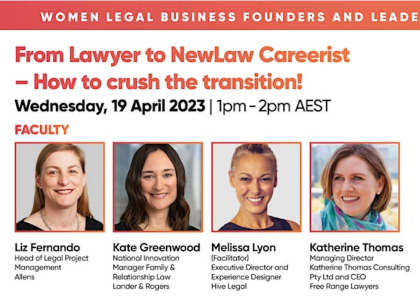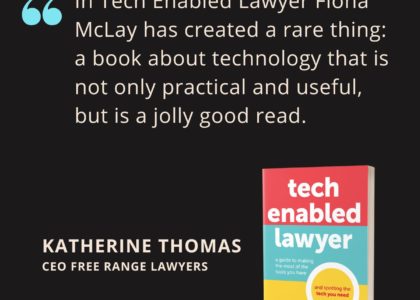While the relationship between businesses and their staff members in the legal profession might be driven by purpose at this point in time, the future “may look very different”.
Speaking recently on webinars hosted by flexible legal resourcing outfit Free Range Lawyers, Nicole Scoble-Williams – who is Deloitte’s leader for future of work in the Asia-Pacific region and co-authored the firm’s new Human Capital Trends Special Report – said there are four potential scenarios for the evolution of the relationship between employers and employees as the market looks ahead to the post-pandemic world.
These scenarios emerge, she said, when taking into account talent supply and government impact drivers.
The four futures
The scenarios explored for the evolving relationship between employer and employee were, firstly, “work is work”, whereby each depends on the other to fulfil work-related needs “but both expect that workers will find meaning and purpose largely outside of work”.
The second scenario was “work as fashion”, in which employers are compelled to respond in the moment to the expressed preferences of staff, and also to competitor moves, “without connecting those actions to a sustainable workforce strategy”.
Thirdly, the scenario of “purpose unleashed” was identified, which sees shared purpose as the foundation of a relationship between employer and employee, with both parties “viewing it as the most important tie that binds them together”.
Finally, “war between talent” was raised, whereby workers are viewed as “interchangeable and easily replaceable”, and as such, they are more concerned with competition with each other than they are with the quality of the relationship with one’s employer.
Purposeful present
Reflecting on Ms Scoble-Williams’ submissions, Free Range Lawyers CEO Katherine Thomas (pictured) said that the most commonly identified current scenario was “purpose unleashed”, with more than 50 per cent of attendees at the webinars choosing this option.
“Characterised by high levels of government regulation and talent supply, the nature of the worker-employer relationship is communal, with workers and organisations bound together by common values, something that attendees indicated they have observed in the increasing number of small, boutique and alternative practices being launched in Australia,” she said.
“With many workers to choose from in ‘purpose unleashed’, organisations look beyond skills and capabilities to pick only those who share their purpose and vision. With government regulation providing worker protections, workers feel free to make career decisions based on values.”
This particular scenario is challenging to execute, Ms Thomas noted, because it requires “absolute authenticity”, with the organisation’s purpose being the central tenet of the worker experience, running through everything the organisation decides, says, and does.
Fragmented future
It is possible, if not likely, that all four scenarios will become probable, Ms Thomas said, noting that legal professionals can see movement away from “the domination of purpose unleashed” within the next few years.
“‘Work-is-work’ emerged as the most commonly anticipated future, attracting 32 per cent of the votes. In this scenario, where government regulation is high, but supply of talent is low, the worker-employer relationship is professional, with workers expecting to find purpose and fulfilment largely from activities outside work,” she said.
“Recent events support a scenario where lawyers are increasingly able to name their terms, be they higher salaries, more flexibility, or a greater distinction between work and outside interests. For example, speakers at a recent seminar on Thomson Reuters’ State of the Market report suggested that lawyer wages could surge by as much as 10 per cent over the next few years due to ‘a shortage of quality people around’.”
This indicates, Ms Thomas surmised, that the employer-employee dynamic in our sector is “moving towards a more pragmatic scenario”, that sees work primarily as a source of income rather than purpose or emotional fulfilment.
“War-between-talent” was a close second, she continued, with 29 per cent of the vote.
“Here, government regulation and talent supply are low, leaving an impersonal worker-employer relationship where employers view workers as interchangeable and workers are focused on competing between each other for roles,” she listed.
“‘Purpose unleashed’ came in third, with 23 per cent of the vote, leaving 16 per cent for ‘work-as-fashion’, a low regulation, low talent supply scenario in which employers feel compelled to chase and respond to worker sentiment and competitor moves.
“Here, employers adopt whatever tactic is required to attract and engage with workers, with little reference to an overarching sustainable workforce strategy grounded in values that do not change,” she said.
Choice and Consequence
Ms Scoble-Williams went on to note that Deloitte’s research indicates that government regulation and talent supply exert the strongest influence over the worker-employer relationship in most industries. Ms Thomas noted that this is playing out in the legal sector, where there are strong trends in both areas.
“Government regulation is increasing, albeit from a low base. The regulation of graduate lawyers’ hours is just one example of how things are changing. At the same time, the talent market is more dynamic than it has been for a long time, with high levels of demand combined with an increasing variety of employment options,” she said.
“However, it’s important to remember that the legal sector comprises a variety of different experiences. The picture is nuanced and different parts of the market will experience different scenarios.”
The legal marketplace is in a moment, Ms Thomas surmised, of “choice and consequence”.
“There is a lot at stake with the decisions we make when we are in, or headed towards, any one of the four possible futures. Those choices are pivotal to our ability to create a differentiated and sustainable worker-employer relationship that attracts, engages and develops the talent we need to thrive in a post-pandemic world.”
Fertile ground for flexible resourcing
Ms Thomas said that Ms Scoble-Williams’ deductions correspond with what she is witnessing in the market.
“The predominance of ‘work-is-work’ as a future scenario accords with what we’re seeing. Organisations are struggling to find the talent they need. At the same time, low supply of talent is giving individuals the confidence to be honest about where work fits into their lives,” she outlined.
“They want quality projects, but they don’t mind saying that this isn’t their reason for living: their purpose lies outside the professional realm. These are ideal conditions for contract/freelance work, which meets the needs of both organisation and individual in a ‘work-is-work’ scenario.”



